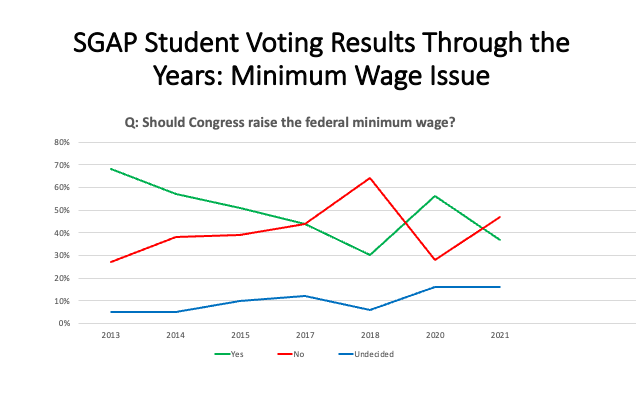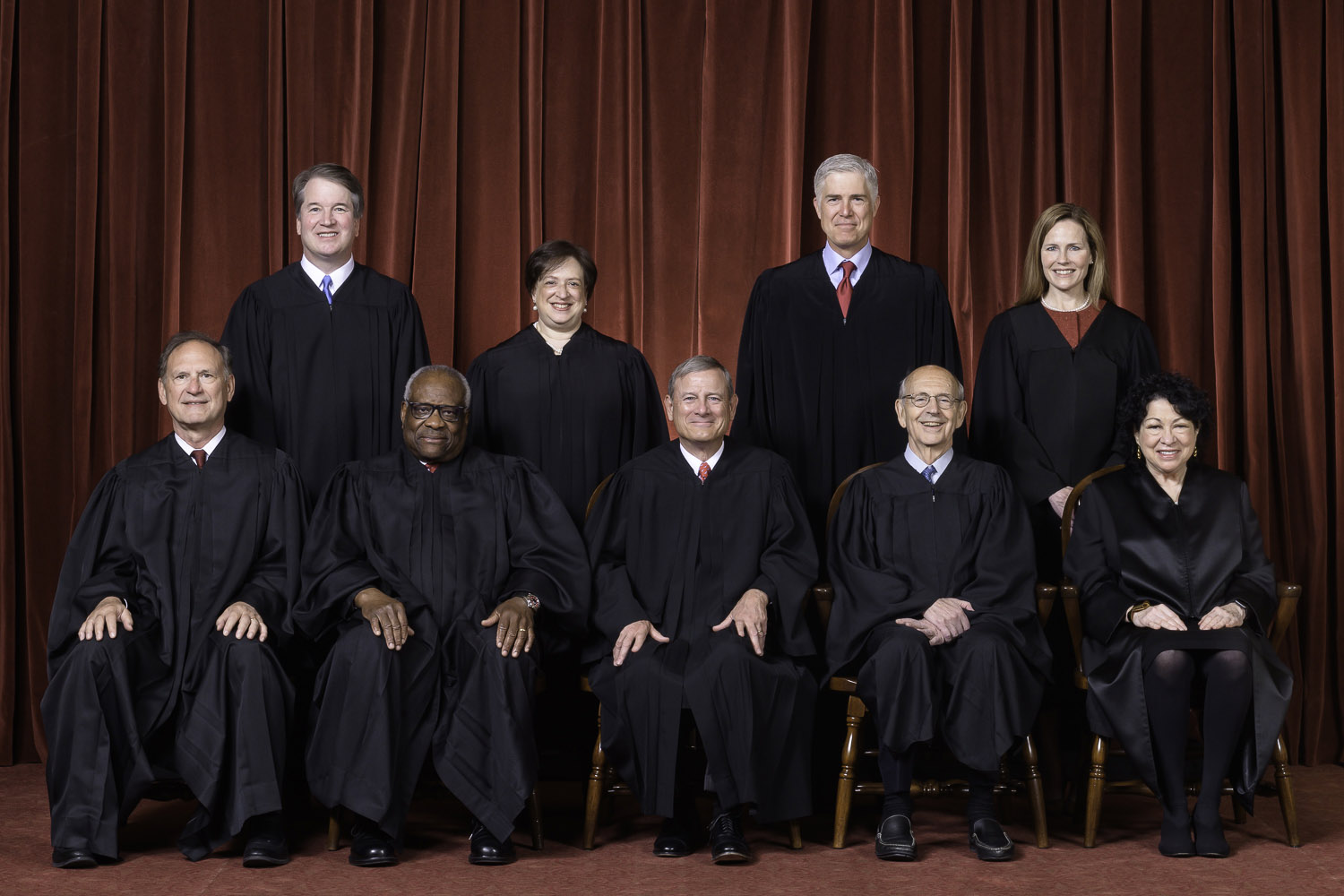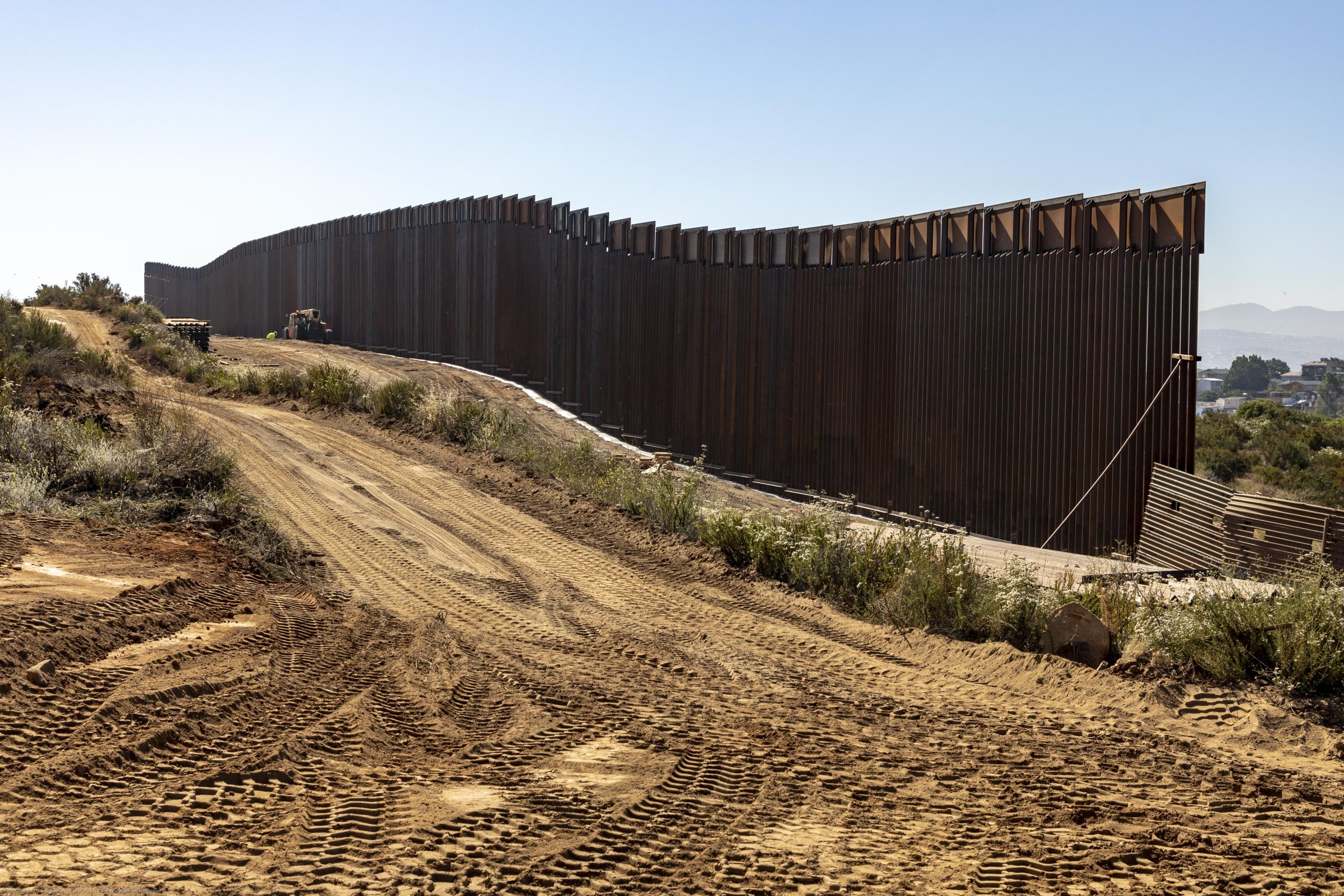Ideas for Teachers
Ideas for Teachers for December 2022
RESEARCH LINKS
Issue 1: Social Media
Medium.com OpEd: “Section 230 – Mend It, Don’t End It”
National Review: “Elon Musk and the Third Era of Social Media”
“Communications Decency Act Pros and Cons”
Electronic Frontier Foundation: “Section 230 of the Communications Decency Act”
Lawfare Blog: “Supreme Court … Gonzalez v. Google and Twitter v. Taamneh”
NPR: “Democrats Hold Social Media Companies Responsible Health Misinformation”
Issue 2: Minimum Wage
Congress.gov: “H.R.603 – Raise the Wage Act of 2021”
House.gov: “Top Democrats Introduce Bill Raising Minimum Wage to $15 by 2025”
Senate.gov: “Raise the Wage Act of 2021 Fact Sheet”
Department of Labor: “History of Changes to the Minimum Wage Law”
Economic Policy Institute: “Why America Needs a $15 Minimum Wage”
raisetheminimumwage.com: “Letter to Congress Support Raising Minimum Wage”
DISCUSSION QUESTIONS
Issue 1: Social Media
- If the government were to have censorship authority over social media platforms, would that result in the protection of Americans’ rights or loss of them? Explain your reasoning.
- In your own experience with social media, have you encountered rude or abusive behavior from others? If so, what do you think is a good solution to this problem?
- Should the social media platform itself be responsible for the comments of users? Why or why not?
- How does the Bill of Rights’ First Amendment protect free speech in the U.S.?
- Do you believe Section 230’s protections for big tech companies need to be revised? How would you revise them?
Issue 2: Minimum Wage
- Do you support or oppose raising the federal minimum wage? If you were speaking to a person who disagreed, what is the strongest argument in support of your position?
- If you were a business owner, would you want the minimum wage to increase? Why or why not?
- What are two arguments against raising the minimum wage? What are two arguments in favor of raising the minimum wage?
- How would a minimum-wage worker’s life be changed as a result of lifting the minimum wage from $7.25 per hour to $15 per hour?
- Places like New York, Oakland, San Francisco and Seattle have raised the minimum wage in their cities. Why do you think these places have raised their municipal minimum wage?
Ideas for Teachers for November 2022 Issues
RESEARCH LINKS
Issue 1: Student Loan Debt

STUDENT LOAN BORROWERS in the United States owe a collective nearly $1.75 trillion in federal and private student loan debt as of August 2022, according to the Federal Reserve Bank of St. Louis.
Congress.gov: H.R.8729 “Debt Cancellation Accountability Act of 2022”
Congress.gov: S.4483 “Debt Cancellation Accountability Act of 2022”
whitehouse.gov: “President Biden Announces Student Loan Relief 4 Borrowers”
GOP House.gov: “Biden’s Student Loan Giveaway to the Wealthy”
GOP House.gov: “CBO: Biden’s Biggest Executive Actions Come with Price Tag”
Wall Street Journal: “Biden’s Student Loan Forgiveness Plan to Cancel Debt”
Associated Press: “GOP states sue Biden administration over student loan plan”
Issue 2: Puerto Rico Statehood
Congress.gov: H.R.8393 “Puerto Rico Status Act”
House.gov: “Chair Grijalva Introduces Historic Puerto Rico Status Act”
LatinoRebels.com: “Puerto Rico Status Act Stalls in House, ‘Outside Interests’”
House.gov: “Rep. García’s Statement on His Vote on the Puerto Rico Status Act”
PuertoRicoReport.com: “Supporters Rally for the Puerto Rico Status Act”
CRS: “Statehood Process + Political Status of U.S. Territories”
DISCUSSION QUESTIONS
Issue 1: Student Loan Debt
- Should any student debt be canceled? If so, who is “deserving” of cancellation, and on what timeline?
- If all future students were provided with a pathway to a debt-free public college going forward, does that make student debt cancellation more or less reasonable?
- Why is the question over forgiving federal student loan debt so controversial?
- How have the opportunities in the job market for someone with a degree changed in the last 10 to 50 years?
- Is it important to have a significant number of young people attend college, including young people that are going to require loans to afford college?
Issue 2: Puerto Rico Statehood
- Do you support or oppose H.R.8393? If you were speaking to a person who disagreed with you, what would you say is the strongest argument in support of your position?
- Should Puerto Rico be granted statehood? Why or why not?
- What other policies could mitigate the problems seen by proponents of statehood? Explain your answer(s).
- Should any or all of the other U.S. territories be granted statehood? Why or why not?
- What other measures might be considered, if any, to resolve Puerto Ricans’ lack of representation in Congress, citizenship, and other concerns?
Ideas for Teachers for October 2022 Issues
RESEARCH LINKS
Issue 1: Methane Emissions
Regulations.gov: “EPA’s Proposed Rule on Emissions Guidelines”
Congressional Research Service: “IRA Methane Emissions Charge Brief”
Competitive Enterprise Institute: “Biden Methane Rule Would Cause Decline”
Washington Post: “Biden Unveils New Rules to Curb Methane”
The National Law Review: “EPA Proposes New Methane Regulations”
RMI.org: “Methane: A Threat to People and the Planet”
Issue 2: For the People Act
Congress.gov: H.R.1 – “For the People Act of 2021”
Conservative Action Project: “Conservatives Oppose H.R.1, Fantasy of the Left”
Brennan Center for Justice: “Congress Must Pass the ‘For the People Act’”
Roll Call: “10 Things You Might Not Know about H.R.1”
Heritage Foundation: “H.R.1 Is a Threat to American Democracy”
Fox News: “H.R.1 Imperils Free and Fair Elections, Here Are the Worst Parts”
Sen. Joe Manchin (D-WV) OpEd: “Why I’m Against the For the People Act”
DISCUSSION QUESTIONS
Issue 1: Methane Emissions
- Where do you stand on whether the U.S. government, and specifically the Environmental Protection Agency, should be doing about global warming and climate change?
- Why are methane emissions from transportation a problem? Do you have any suggestions for how methane emissions can be reduced?
- What alternative sources of fuel or other means of transport are available, which would reduce emissions?
- How does the distance from your school effect your emissions? How did your grandparents travel to school? How do you think your grandchildren will travel to school?
- Do you think recent changes in climate and weather are more attributed to natural or human causes? Explain your reasons.
Issue 2: For the People Act
1. Do you support or oppose H.R.1? If you were speaking to a person who disagreed with you, what would you say is the strongest argument in support of your position?
2. Does H.R.1 represent federal government overreach into territory best left to the states? Why or why not?
3. Are the bill’s ethics provisions necessary? Why or why not?
4. Are H.R.1’s improvements in access to elections, through ease of registration, early voting, and more accurate voter rolls, necessary? Why or why not?
5. Do the disclosure provisions around political ads and political spending represent a threat to free speech, or a needed opening to identify who is influencing our democracy?
Research Links and Discussion Questions for September 2022 Issues
RESEARCH LINKS

The U.S. Supreme Court as composed October 27, 2020, to June 30, 2022. (Front row, L to R) Samuel A. Alito, Jr., Clarence Thomas, Chief Justice John G. Roberts, Jr., Stephen G. Breyer, and Sonia Sotomayor. (Back row, L to R) Brett M. Kavanaugh, Elena Kagan, Neil M. Gorsuch, and Amy Coney Barrett.
Issue 1: Protecting Our Kids Act
Congress.gov: H.R.7910 “Protecting Our Kids Act”
Congressional Budget Office: “Estimated Budgetary Effects of Protecting Our Kids Act”
RAND Corporation: “Gun Policy in America — Effects of Minimum Age Requirements”
Pew Trusts: “Few States Seem Ready to Raise Age to Buy Semi-Automatic Rifles”
The Hill: “House Passes Sweeping Gun Package in Largely Party-Line Vote”
Fox News: “House Votes to Set Minimum Age for Buying Semi-automatic Weapons”
Issue 2: Judiciary Act
Congress.gov: S.1141 “Judiciary Act of 2021”
Sen. Roy Blunt Op-Ed: “Don’t Pack SCOTUS, Truth Behind Democrats’ Push for Reform”
Rutgers University: “What Is Court Packing?”
Reason.com: “House Democrats Revive Their Court-Packing Push”
Supremecourt.gov: “The Court as an Institution”
Pacific Legal Foundation: “Court Packing Explained”
Democracy Journal: “Let’s Think About Court Packing”
DISCUSSION QUESTIONS
Issue 1: Protecting Our Kids Act
1. If passed, would the Protecting Our Kids Act would be effective at reducing gun violence and mass shootings in the U.S.? Why or why not?
2. Do you think raising the age from 18 to 21 to purchase semiautomatic weapons would reduce school shootings? Why or why not?
3. Looking at the pro/con quotes made by members of Congress on p. 3 of the newsletter, what do their statements tell you about the bill?
4. Search for #ProtectingOurKidsAct on Twitter and/or other social media sites. How do others’ perspectives help you understand the bill?
5. In Japan there are strict gun control laws and so there is very little gun crime. Should all countries follow Japan to lower gun crime?
Issue 2: Judiciary Act
1. Should packing the Supreme Court ever be considered? Why or why not?
2. Does the current method of waiting until a Justice retires or dies and allowing the current president to appoint a new justice work? Why or why not?
3. If you could wave a magic wand, what would the ideal Supreme Court look like? Consider how many justices, the nomination and approval process, term limits, and other ideas. Support your opinions and argue why this court would be the best.
4. What are the steps in the nomination process for Supreme Court Justices? What constitutional actors are involved?
5. What qualities should a Supreme Court justice have? How much does a candidate’s political ideology influence a presidential nomination today?
Research Links and Discussion Questions for May 2022 Topics
RESEARCH LINKS
Issue 1: Energy Independence
Congress.gov: H.R.6858 “American Energy Independence from Russia Act”
Congress.gov: S.3752 “American Energy Independence from Russia Act”
Politico: “Republicans Seize on Ukraine to Attack Biden’s Climate Policies”
NBC News: “Republicans Cheer Russian Oil Ban, Jeer Biden for Rising Prices”
League of Conservation Voters: “Clean Energy Is Key to Energy Independence”
Center for American Progress: “U.S. Can’t Drill Its Way to Energy Independence”
Issue 2: CROWN Act
Congress.gov: H.R.2116 “Creating Respectful and Open World Natural Hair Act”
NAACP Legal Defense and Education Fund: “Natural Hair Discrimination”
NPR: “House passes CROWN Act banning discrimination on race-based hairdos”
American Bar Association: “Is Hair Discrimination Race Discrimination?”
thecrownact.com: “Official Campaign of CROWN Act Led by CROWN Coalition”
Washington Post: “House Passes Crown Act, Banning Discrimination Black Hair”
DISCUSSION QUESTIONS
Issue 1: Energy Independence
1. Why would a country want to achieve energy independence? What are the benefits?
2. Which approach should be at the heart of U.S. national energy policy—increasing energy production domestically or shifting the emphasis to renewable energy resources such as wind and solar? Outline the reasons for your answer.
3. What should the United States do about climate change? Should it adopt strong policies to reduce the use of fossil fuels? Or should it encourage more research and hold off on adopting strict requirements for now? Why?
4. Will rising U.S. oil and gas production change U.S. relationships with major oil- and gas-producing countries, and if so, how?
5. Would a shift to renewable energy or electric vehicles introduce new security vulnerabilities? Why or why not?
Issue 2: CROWN Act
1. How has European imperialism and colonialism influenced global beauty standards over time? Are those standards now changing?
2. What kind of hair did you want as a child? What kind of hair do you want now? Has that changed?
3. Actress Tracie Thoms says, “It’s amazing that it is considered revolutionary to wear my hair the way it grows out of my head.” She describes natural hair as “freedom.” Do you think that not wearing make-up or not shaving is similarly “revolutionary” or “freeing?” Why or why not?
4. Does a person’s hair or hairstyle impact their personal brand, career advancement and/or job performance? Why or why not?
5. How does societal acceptance of a person’s natural hair texture affect their identity and self-esteem?
Research Links and Discussion Questions for April 2022 Topics
RESEARCH LINKS
Issue 1: Border Wall

On 06-19-1019 construction crews continue work on the replacement border wall on the boundary between the United States and Mexico near the Calexico Port of Entry.
Photo by Mani Albrecht
U.S. Customs and Border Protection
Office of Public Affairs
Visual Communications Division
Congress.gov: H.R.5810 “To Authorize Transfer of Materials for Border Wall”
Dallas Morning News OpEd: “The Border Wall—A Barricade or a Safeguard?”
ThoughtCo.com: “Weighing the Pros and Cons of U.S.-Mexico Border Barrier”
Fox News: “Governor Abbott Announces Details on Texas Border Wall”
govtrackinsider.com: “Bill would give states materials to resume border wall”
ProCon.org: “Should the U.S. Build a Wall along the U.S./Mexico Border?”
Issue 2: Daylight Saving Time
Congress.gov: S.623 “Sunshine Protection Act of 2021”
National Conference of State Legislatures: “DST State Legislation”
Politico: “Here Comes the Sun: Senate Agrees on Permanent Daylight Saving”
Journal of Clinical Sleep Medicine: “American Academy of Sleep Medicine”
Smithsonian: “What Happened the Last Time U.S. Made DST Permanent?”
BuzzFeedNews: “Everyone Was Surprised by Senate Passing Permanent DST”
DISCUSSION QUESTIONS
Issue 1: Border Wall
- Do you think the current approach to U.S. border security is effective? What ideas do you have to make it more effective?
- Do you think all, some or no national borders around the world should have walls or fences separating countries? Why?
- What differences do you discern between the two border crossings with Mexico and Canada?
- Do you think that the border wall has become a political symbol for its supporters and opponents? Why or why not?
- What might a wall represent psychologically? For instance, might it symbolize safety or preserve a way of life?
Issue 2: Daylight Saving Time
- Should the United States make Daylight Saving Time permanent year round? Why or why not?
- Do you feel the effects of springing forward and/or falling back? What are the effects and how do they impact your day?
- Now that you’ve read the arguments for permanent Daylight Saving Time, visit https://savestandardtime.com/ and read the arguments for permanent Standard Time. What are the benefits and drawbacks of each proposal? Which time system do you think is best for the U.S. and why?
- Why do you think some places like Hawaii and most of Arizona opt out of Daylight Saving Time?
- Compare and contrast the economic benefits and disadvantages of Daylight Saving Time. Is DST good or bad for the economy overall? Explain your answer.
Research Links and Discussion Questions for March 2022 Topics
RESEARCH LINKS
Issue 1: 32-Hour Workweek
Congress.gov: H.R.4728 “Thirty-Two Hour Workweek Act”
The Guardian OpEd: “A 4 Day Work Week Is the Future. Here’s Why.”
The Hill: “Lawmakers lining up behind bill to bring four-day work week to America”
Forbes: “Is Thursday the New Friday? Pros and Cons of Reducing Work Hours”
The Atlantic: “What It Means That Kickstarter Is Trying a 4-Day Work Week”
govtrack.us: “H.R. 4728: Thirty-Two Hour Workweek Act”
Issue 2: America COMPETES Act
Congress.gov: H.R.4521 “America COMPETES Act of 2022”
Congress.gov: S.1260 “United States Innovation and Competition Act of 2021”
House.gov: “America COMPETES Act of 2022” Backgrounder
The Hill: “House Republicans Bash Democrats’ China Competition Bill”
cnbc.com: “Senate Passes Bipartisan Tech and Manufacturing Bill Aimed at China”
Fox Business: “Democrats’ China competition bill hurts American small businesses”
DISCUSSION QUESTIONS
Issue 1: 32-Hour Workweek
- How do you think having a shorter workweek will affect workers’ productivity? Will it rise, fall or remain the same? Why?
- How might a shorter workweek be good for the environment?
- In Japan, Microsoft trialed a four-day workweek and saw improvements in workers’ productivity and job satisfaction. Do you think this would work in the U.S.? Why or why not?
- Is a four-day workweek suitable for every company? Why or why not?
- How did the COVID pandemic change American workers’ expectations about work/life balance?
- How might spending less time working result in greater workforce focus and productivity?
Issue 2: America COMPETES Act
1. Read the summaries for both the House and Senate China competition bills (links above). Which bill do you think offers the best solution to the problem?
2. What do you think is the best solution to China’s theft of U.S. intellectual property?
3. Should the U.S. attempt to have a “less confrontational” relationship with China? Why or why not?
4. Should the U.S. view China as a threat or opportunity? Why?
5. Do you think China will surpass the U.S. as the world’s superpower? Why or why not?
Research Links and Discussion Questions for February 2022 Topics
RESEARCH LINKS
Issue 1: Free College Tuition
Congress.gov: S.1288 “College for All Act of 2021”
Heritage Foundation OpEd: “The High Cost of Free College Tuition”
Peter G. Peterson Foundation: “What Is Free College and How Much Cost?”
Cato Institute: “Free College Will Hike Costs for Taxpayers”
Roll Call: “Proposed Education Spending Hike Faces Resistance in Senate”
Philadelphia Inquirer: “Should Public College Be Free? Pro Con”
Issue 2: Free Child Care
Congress.gov: H.R.5376 “Build Back Better Act”
Kaiser Family Foundation: “Women, Work and Family During COVID Survey”
First Five Years Fund: “Child Care System Is Not Meeting the Needs of Families”
U.S. Chamber of Commerce: “Economic Impact of Childcare Breakdown”
Politico: “A Lack of Child Care Is Keeping Women on Unemployment Rolls”
Center for Law and Social Policy: “Things to Know about Child Care and BBB”
DISCUSSION QUESTIONS
Issue 1: Free College Tuition
- Are you for or against U.S. taxpayers funding free college tuition? Why?
- Would implementing taxpayer-funded college tuition make it too easy for colleges to raise costs, knowing the government will pay for them? Why or why not?
- Should there be a cap on tuition that would be considered “free?” How should incidental costs be covered? How would existing student financial aid programs be affected?
- Would tuition-free public college expand access to education for American families, or restrict it? Why?
- Providing government-funded college tuition would no doubt increase the number of students who register at community colleges. Would this encourage or discourage innovation among those institutions?
Issue 2: Free Child Care
- Should the government subsidize the cost of childcare for all families? Why or why not?
- Should child care be left to individual families or is it a societal issue? Justify and defend your position using reasoning and logic.
- Sen. Amy Klobuchar (D-MN) said, “It’s impossible to have a strong economy when it’s too expensive to work because of child care.” Do you agree with her statement? Why or why not?
- How is the issue of making child care affordable tied to gender equality?
- Would providing taxpayer-funded child care to poor, disadvantaged and low-skilled households level the playing field for these populations? Why or why not?
Research Links and Discussion Questions for December 2021 Topics
RESEARCH LINKS
Issue 1: Methane Emissions
EPA’s Proposed Ruling on Methane Emissions https://bit.ly/3kMy9DD
WaPo: “Biden Unveils New Rules to Curb Methane” https://wapo.st/3oAUWDy
The National Law Review: “EPA Proposes New Methane Regulations for Gas” https://bit.ly/2YTxzfC
Yahoo: “Biden Announces Sweeping Methane Plan” https://yhoo.it/2YYBtUG
RMI.org: “Methane: A Threat to People and the Planet” https://bit.ly/3cmNYMQ
Forbes: “Biden Promises Moves on Methane, Businesses Poised for Growth” https://bit.ly/2YSWhN8
Issue 2: Civil Asset Forfeiture
Congress.gov: “Fifth Amendment Integrity Restoration Act of 2021” (H.R.2857) https://bit.ly/30yiAbj
Rep. Tim Walberg (R-MI): “Civil Asset Forfeiture” https://bit.ly/3qGiREm
The Bulwark: “Maine Bans Civil Asset Forfeiture” https://bit.ly/3kN1yxI
Institute for Justice: “Civil Forfeiture Reforms on the State Level” https://bit.ly/3DrxO0C
endforfeiture.com: “IJ’s Initiative to End Policing for Profit” https://endforfeiture.com/
Institute for Justice: “Policing for Profit (2nd Edition)” https://bit.ly/3Hp9EGt
DISCUSSION QUESTIONS
Issue 1: Methane Emissions
1. What are some of the things we could change in the way we live and work to help decrease the amount of greenhouse gases such as methane we emit into the atmosphere? What would we, as individuals, be willing to give up, to help this process?
2. Making changes usually means someone pays, in some way. Is this true of global warming? How do we as individuals pay now? And how does industry pay? What or who should take most of the financial responsibility?
3. Which is more of a problem for global warming—population growth or industrial growth? Or is it a matter of how industry operates and grows?
4. What impact will rising greenhouse gases have on the climate?
5. What are the main threats of climate change?
Issue 2: Civil Asset Forfeiture
- How should law enforcement agencies balance their mission to fight crime while respecting the rights of the suspected and the accused?
- Should civil asset forfeiture be expanded as law enforcement tool, or should it be abolished?
- Are there ways to reform the system to ensure that only the guilty feel the effects of forfeiture?
- Do you think it is justified to take money or property from people accused of committing a crime, but have not been convicted by a judge or jury of doing so? Explain your answer.
- What is your perspective? Is asset forfeiture practiced responsibly, or is it in need of reform? Why do you take your position?
Research Links and Discussion Questions for May 2021 Topics
RESEARCH LINKS
Issue 1: Vaccine Passports
WhiteHouse.gov: “Press Briefing by White House COVID-19 Response Team”
NPR.org: “Florida Governor DeSantis Rejects Vaccine Passports”
Bloomberg.com: “A Vaccine Passport Is the New Golden Ticket”
BuzzFeedNews.com: “You Probably Already Have a Vaccine Passport”
ABCNews.go.com: “Texas Governor Bans Mandated Vaccine Passports”
CNN.com: “What Are Vaccine Passports and How Do They Work?”
Issue 2: Dream Act
Congress.gov: H.R.6 American Dream and Promise Act
WhiteHouse.gov: “Statement by President Biden American Dream Promise Act”
The Heritage Foundation: “The American Dream and Promise Act of 2021”
ImmigrationForum.org: “Bill Summary: American Dream and Promise Act”
TheHill.com: “Tim Cook Calls on Congress to Pass American Dream Promise Act”
BusinessInsider.com: “House Passes the American Dream and Promise Act”
DISCUSSION QUESTIONS
Issue 1: Vaccine Passports
- Do you support or oppose vaccine passports? If you were speaking to a person who disagreed, what is the strongest argument in support of your position?
- Does requiring a vaccine passport represent government overreach? Why or why not?
- Privacy advocates warn that vaccine passports are intrusive. Do you agree? Why or why not?
- What civil liberties do vaccine passports potentially threaten?
- What are some of the reasons Republican governors oppose vaccine passports? Do you agree or disagree with them? Why?
Issue 2: Dream Act
- What do you think the U.S. government should do to address the legal status of undocumented immigrants who came to the United States as children?
- Who are the Dreamers? What requirements must they meet to be eligible for citizenship under the Dream Act?
- What is the most compelling argument to pass the Dream Act? What is the most convincing reason not to?
- Should the president have the power to enact a program like DACA if Congress refuses to pass the Dream Act? Why or why not?
- What solutions might students offer legislators when considering the futures of young people brought to the country as children?
Research Links and Discussion Questions for April 2021 Topics
RESEARCH LINKS
Issue 1: H.R.1/Election Reform
Congress.gov: H.R.1 – “For the People Act of 2021”
Conservative Action Project: “Conservatives Oppose H.R.1, Fantasy of the Left”
Brennan Center for Justice: “Congress Must Pass the ‘For the People Act’”
Roll Call: “10 Things You Might Not Know about HR 1”
Heritage Foundation: “H.R.1 Is a Threat to American Democracy”
Fox News: “H.R.1 Imperils Free and Fair Elections, Here Are the Worst Parts”
Issue 2: D.C. Statehood
Congress.gov: H.R.51 – “Washington, D.C. Admission Act”
Cato Institute: “D.C. Statehood Is a Fool’s Errand”
League of Women Voters: “D.C. Statehood Tool Kit”
Heritage Foundation: “D.C. Statehood Bill Is Constitutionally Dubious, Flawed”
Rep. Norton: “The Fight for D.C. Statehood”
51 for 51 Website: “Issues”
DISCUSSION QUESTIONS
Issue 1: H.R.1/Election Reform
- Do you support or oppose H.R.1? If you were speaking to a person who disagreed, what is the strongest argument in support of your position?
- Does H.R.1 represent government overreach? Why or why not?
- Are the bill’s ethics provisions necessary? Why or why not?
- Are H.R.1’s improvements in access to elections, through ease of registration, early voting, and more accurate voter rolls, necessary? Why or why not?
- Do the disclosure provisions around political ads and political spending represent a threat to free speech, or a needed opening to identify who is influencing our democracy?
Issue 2: D.C. Statehood
- What are some of the reasons that Republicans oppose making D.C. a state?
- Why do you think the framers of the U.S. Constitution decided that the nation’s capital should not be located in any state?
- What rights are people in D.C. denied that other Americans enjoy?
- Why did it require a constitutional amendment to give people in D.C. the right to vote for President?
- Democrats are for D.C. statehood, but Republicans are against it. What might account for such differing views on this issue?
Research Links and Discussion Questions for March 2021 Topics
RESEARCH LINKS
Issue 1: Minimum Wage
Congress.gov: H.R.603, “Raise the Wage Act of 2021” https://bit.ly/3rJJwgC
U.S. Department of Labor: “Minimum Wage” https://bit.ly/3rVLUkP
Congressional Budget Office: “Budgetary Effects Raise the Wage Act of 2021” https://bit.ly/371TmCA
National Congress of State Legislatures: “State Minimum Wages” https://bit.ly/3p6PVAN
UC Berkeley Labor Center: “The Public Cost of a Low Federal Minimum Wage” https://bit.ly/2MOQ1QK
raisetheminimumwage.com: “Raise the Minimum Wage News” https://bit.ly/3pfBdaF
Issue 2: Keystone XL Pipeline
White House: “Executive Order Protecting Public Health and Environment” https://bit.ly/3qfqTAX
National Resources Defense Council: “What is Keystone Pipeline?” https://on.nrdc.org/3acrOg6
TC Energy: “Keystone XL” (from the company that owns the pipeline) https://www.keystonexl.com
U.S. Chamber of Commerce Global Energy Institute: “Background Keystone XL” https://bit.ly/2ZaixOY
The Guardian: “Biden Can Be Our Climate President by Ending Pipeline Projects” https://bit.ly/3tMnGLt
Fox News: “Manchin Pens Letter Asking Biden to Reverse Pipeline Termination” https://fxn.ws/3tHtjdI
DISCUSSION QUESTIONS
Issue 1: Minimum Wage
- Do you support or oppose raising the minimum wage? If you were speaking to a person who disagreed, what is the strongest argument in support of your position?
- If you were a business owner, would you want the minimum wage to increase? Why or why not?
- What are two arguments against raising the minimum wage? What are two arguments in favor of raising the minimum wage?
- How is a minimum-wage worker’s life changed as a result of lifting the minimum wage from $7.25 per hour to $15 per hour?
- Places like New York, Oakland, San Francisco and Seattle have raised the minimum wage in their cities. Why do you think these places have raised their municipal minimum wage?
Issue 2: Keystone XL Pipeline
- What are some potential benefits of the pipeline? How about potential drawbacks?
- In what ways does the decision we make today about the Keystone XL Pipeline affect people in the future?
- The Biden administration cancelled construction of the Keystone XL Pipeline, but the Trump administration supported it. What might account for such differing views on construction of the pipeline?
- What are some of the reasons that environmentalists oppose the Keystone XL pipeline expansion?
- Do you think that addressing climate change is an issue that should be prioritized over creating jobs? Are these options mutually exclusive?
Research Links and Discussion Questions for February 2021 Topics
RESEARCH LINKS
Issue 1: Paris Climate Agreement
White House: “Statement by President Trump on the Paris Climate Accord” (6/2017)
Biden Campaign Site: “Biden’s Clean Energy Plan”
United Nations Foundation: “7 Reasons U.S. Needs the Paris Climate Agreement”
Climate Action Tracker
Center for Climate and Energy Solutions: “Paris Climate Agreement Q&A”
Fox News OpEd: “Biden wants to rejoin the Paris Accord. Why? It puts America last.”
Issue 2: Dream Act
Congress.gov: “H.R. 6: American Dream and Promise Act of 2019”
Daily Caller OpEd: “Why I Oppose the Dream Act”
Chicago Tribune Column: “Dreamers are still waiting for their nightmare to end”
Press Democrat OpEd: “A New Year’s Resolution for Congress – Pass the Dream Act”
Business Standard: “Google Backs Biden’s Immigration Efforts”
Between the Lines OpEd: “Immigration Reform Under Biden to Face Challenges”
DISCUSSION QUESTIONS
Issue 1: Paris Climate Agreement
- What is your position on climate change? Do you think it is caused by human activity or not? Outline your arguments and defend your position.
- Compare and contrast the pro/con congressional quotes on p. 3 of the newsletter. Whose opinion do you agree with the most, and why?
- Do you support the U.S. rejoining the Paris Climate Agreement? Why or why not?
- According to studies, disputes over the key scientific facts of global warming are more prevalent in the U.S. than globally. Why do you think this is so?
- Read the Fox News OpEd (link above). Do you agree or disagree with the assertions made in the article? Why?
Issue 2: Dream Act
- What do you think the U.S. government should do to address the legal status of undocumented immigrants who came to the United States as children?
- Who are the Dreamers? What requirements must they meet to be eligible for citizenship under the Dream Act?
- What is the most compelling argument to pass the Dream Act? What is the most convincing reason not to?
- Should the president have the power to enact a program like DACA if Congress refuses to pass the Dream Act? Why or why not?
- What solutions might students offer legislators when considering the futures of young people brought to the country as children?
Research Links and Discussion Questions for December 2020 Topics
RESEARCH LINKS
Issue 1: Social Media Bias
White House: “Executive Order on Preventing Online Censorship”
The Hill OpEd: “Censoring Biden Story, How Social Media Becomes State Media”
Pew Research: “Most Americans Think Social Media Sites Censor Political Views”
CBS News: “Censorship on social media? It’s not what you think”
Cato Institute: “Why the Government Should Not Regulate Social Media”
The Hill: “FCC to Move Forward with Executive Order on Tech’s Liability”
Issue 2: Universal Basic Income
Stanford University: “What is Universal Basic Income?”
USA Today: “California city to give free cash in guaranteed income program”
Andrew Yang: “The Freedom Dividend, Defined”
Pew Research: “More Americans Oppose than Favor Universal Basic Income”
GiveDirectly.org: “Universal Basic Income Study”
Pew Charitable Trusts: “Momentum for Basic Income Builds as Pandemic Drags”
DISCUSSION QUESTIONS
Issue 1: Social Media Bias
- Read President Donald Trump’s “Executive on Preventing Online Censorship” (link above). Do you feel his action was a good solution to social media bias? Why or why not?
- In your own experience with social media, have you encountered social media bias? If so, what do you think is a good solution to this problem?
- How does the Bill of Rights’ First Amendment protect free speech in the U.S.?
- Do you believe Section 230’s protections for big tech companies need to be revised? How would you revise them?
- Do you believe Twitter’s and Facebook’s response to the New York Post article on Hunter Biden was justified? Why or why not?
Issue 2: Universal Basic Income
- Should Universal Basic Income replace existing welfare programs? Why or why not?
- If Universal Basic Income became a reality, how much should it be per month?
- Some people believe that giving everyone a UBI would simply lead to higher prices (e.g., inflation), defeating the entire point of it. Do you agree or disagree? Why?
- Should UBI really go to everyone, or would it be better to target it to those who need it most? Why or why not?
- Would implementing a UBI program de-incentivize people to work? Why or why not?
Research Links and Discussion Questions for November 2020 Topics
RESEARCH LINKS
Issue 1: TikTok
WhiteHouse.gov: “Executive Order Addressing Threat Posed by TikTok”
Commerce.gov: “Commerce Department Prohibits WeChat TikTok Transactions”
Sen. Ted Cruz: “Deal that Fails to Address National Security Concerns”
BusinessInsider.com: “TikTok Executive Says Company Has Faced Criticism”
Fox News: “Trump’s TikTok Download Ban Is Blocked by Judge”
cnn.com: “Trump Says He Will Ban TikTok”
Issue 2: Student Loan Debt
Congress.gov: S.2235 “Student Loan Debt Relief Act of 2019”
finaid.org: “Student Loan Debt Clock”
“Warren, Clyburn Introduce Legislation to Cancel Student Loan Debt”
Student Loan Debt Relief Act Fact Sheet
Forbes.com: “Will Trump Cancel Student Loans?”
Fox News: “Dems Propose Suspending Student Loan Payments Amid COVID”
DISCUSSION QUESTIONS
Issue 1: TikTok
- Read President Donald Trump’s “Executive Order Addressing Threat Posed by TikTok” (link above). Do you feel his action was justified? Why or why not?
- Do you feel TikTok poses a national security threat to Americans’ private data? Why or why not?
- What do you think of TikTok? Write an honest review. How does your point of view as a teenager influence your interpretation of it?
- What should be the federal government’s role in regulating social media? In this case, was the President overstepping his authority?
- Read TikTok’s statement on p. 3 of the newsletter. Do you feel satisfied with their assurances? Why or why not?
Issue 2: Student Loan Debt
- How do you think college debt is affecting our economy and community?
- What is an acceptable and reasonable amount of debt for college education?
- Even if students could get a quality, debt-free undergraduate education, what are the best ways to keep institutions at the graduate level, or private schools, from loading up students with unmanageable debt?
- Is it important to have a significant number of young people attend college, including young people that are going to require loans to afford college?
- How have the opportunities in the job market for someone with a degree changed in the last 10 to 50 years?
Research Links and Critical Thinking Questions for October 2020 Topics
RESEARCH LINKS
Issue 1: Electoral College
The Federalist Papers: No. 68 by Alexander Hamilton
FairVote.org: “The Electoral College: How It Works Today”
House.gov: “Electoral College Fast Facts”
Heritage Foundation: “The Electoral College: Enlightened Democracy
League of Women Voters: “Who Will Elect the President? Electoral College System”
NewYorker.com: “The Case for Dumping the Electoral College”
Issue 2: 2020 Election
Vote.org: One-Stop Voting Information Site
Pew Research: “Election 2020”
Ballotpedia.org: “Presidential Election 2020”
270towin.com: “2020 Presidential Election Interactive Map”
ProCon.org: “2020 Presidential Election Site”
NYT: “2020 Presidential Election Calendar”
CRITICAL-THINKING QUESTIONS
Issue 1: Electoral College
- Read Alexander Hamilton’s Federalist No. 68 (link above). Has the Electoral College system worked out the way Hamilton originally envisioned it?
- Is the Electoral College a good way of ensuring each voter is represented equally? If not, do you think it is important that each vote person’s vote count equally?
- Do you think the founders’ reasons for establishing the Electoral College system are still relevant today? Why or why not?
- What is the difference between a democracy and a republic? Why did the Founders dislike democratic systems? Why did they believe republican forms of government were superior?
- Do you think the Electoral College still functions well in the present day? Why or why not?
Issue 2: 2020 Election
- What is the relationship between voting and democracy?
- What information is essential for voters to make an informed decision about candidates?
- Why does campaign spending matter? What rules should exist, if any, about the claims and accusations of political campaigns?
- After reading the candidates’ positions on the issues, which issues are the most important to you and why?
- In your opinion, what are the qualities of a great leader in any political context?
Research Links and Critical Thinking Questions for September 2020 Topics
Research Links
Issue 1: Confederate Statues
Congress.gov: H.R.7573 – Confederate Statues Bill
Govtrack.us: H.R.7573 – Confederate Statues Bill
House Majority Leader Steny Hoyer (D-MD) Remarks H.R. 7573 Press Conference
Rep. Glenn Grothman (R-WI) Statement on Confederate Statue Bill
Harvard Gazette: “Must we allow symbols of racism on public land?”
The Federalist: “Why We Should Keep Confederate Monuments Right Where They Are”
Issue 2: DACA Dreamers
SupremeCourt.gov: Supreme Court’s June 18, 2020 Ruling on DACA Decision
NILC.org: “Supreme Court Overturns Trump Administration’s Termination of DACA”
Worcester.edu: “DACA Infographics & Resources for Educators”
Fox News: “Trump Administration Halts New DACA Applications”
USA Today: “Trump to Extend DACA Protections, Reject New Applications”
ProCon.org: “Are DACA and the DREAM Act Good for America?”
Critical-Thinking Questions
Issue 1: Confederate Statues
- What role do statues or monuments play in society?
- Should confederate statues be taken down? Why or why not? Justify and defend your answer with examples and reasoning.
- If confederate statues were all removed, would that address racial inequality in the United States?
- Regardless of whether these statues are removed or remain, what sort of statues, memorials, or other art would you like to see in public spaces? Explain your answers.
- Do the statues represent or misrepresent the country’s history? How so?
Issue 2: DACA Dreamers
- What do you think Congress should do to address the legal status of undocumented immigrants who came to the United States as children?
- What is the most convincing argument to continue with DACA? What is the most compelling reason to end a program like DACA?
- Should the president have the power to enact a program like DACA if Congress refuses to pass legislation on the issue? Why or why not?
- How might ending the DACA program affect communities around the country?
- What solutions might students offer legislators when considering the futures of young people brought to the country as children?
- How does the Constitution address immigration? Is there a way to clarify Constitutional treatment of immigration?
Research Links and Critical Thinking Questions for May 2020 Topics
Research Links
Surveillance Law (H.R.6172)
Congress.gov: “H.R.6172 – USA FREEDOM Reauthorization Act of 2020”
Subscriptlaw.com: “Overview of Government Surveillance Laws”
Lawfare Blog: “What’s in H.R. 6172, the House’s Compromise FISA Reform Bill?”
The Hill: “Trump, Privacy Hawks Upend Surveillance Brawl”
Reason.com: “A Compromise Bill on Domestic Surveillance Reform”
Common Dreams: “Rights Groups Warn Against Handing Trump Terrifying Spy Powers”
Americans for Prosperity: “AFP Urges Senators to Vote Against FISA Reauthorization”
Equal Rights Amendment
Congress.gov: S.J.Res.6 “Joint resolution removing the deadline for ratification of ERA”
Congress.gov: H.J.Res.79 “Removing the deadline for the ratification of the ERA”
equalrightsamendment.org: “Why We Need the Equal Rights Amendment”
Trump Administration Department of Justice Opinion on ERA
statusofwomendata.org: “The Economic Status of Women in the States”
Washington Post: “It’s time to finally pass the Equal Rights Amendment”
Critical-Thinking Questions
Surveillance Law
- Read the text of “H.R.6172 – USA FREEDOM Reauthorization Act of 2020” (link above). Are the reforms in this bill strong enough? Why or why not?
- One of the reforms in H.R.6172 is the guarantee that House Intelligence Committee members will have access to all FISA applications. Should Congress require additional transparency mechanisms? Why or why not?
- Currently, federal government agencies can issue national security letters on Americans without a warrant and without informing them. Which constitutional amendment(s) do these practices conflict with?
- The argument can be made that compromising our civil liberties in any way means the terrorists have won. Agree or disagree? Explain your reasoning.
- Review the surveillance laws currently in place (link above) that allow the federal government to spy on Americans. Does the government have too much power? Not enough?
Issue 2: Equal Rights Amendment
- Visit https://statusofwomendata.org/, click on the “find your state” arrow and select your state to see how it’s graded for women’s rights. How does your state compare?
- Visit the “Why We Need the Equal Rights Amendment” link above. Do you agree with the ar-guments for the ERA? Why or why not?
- Do you think there are other groups whose rights should be guaranteed by the U.S. government? If so, what are they?
- Are you surprised that the Constitution does not already guarantee rights to women? Why or why not?
- Read the “pro” and “con” quotes for the ERA on p. 3 of the newsletter. Decide whose opinion you agree with most and why?
Research Links and Critical Thinking Questions for April 2020
RESEARCH LINKS
Issue 1: Minimum Wage
Congress.gov: “H.R.582 – Raise the Wage Act”
Fox Business: “Republicans Slam Democrats’ $15 Minimum Wage Bill”
Pew Research: “Minimum Wage Action Is in Cities, States, not Congress”
Yahoo Finance: “CBO: Raising Minimum Wage Has a Downside”
Economic Policy Institute: “Why America Needs a $15 Minimum Wage”
Vox: “$15 Federal Minimum Wage Won’t Cost Americans Jobs, New Study Says”
Department of Labor: “State Minimum Wage Laws”
Issue 2: War Powers
White House: “Statement of Administration Policy on S.J.Res.68”
Congress.gov: “S.J.Res.68 Joint Resolution on Iran War Powers”
Library of Congress: “War Powers”
CNN: “House Passes Iran War Powers Resolution Opposed by Trump”
House.gov: “Power to Declare War” (History)
NPR: “War Powers Resolution On Iran Is Latest Attempt By Congress”
CRITICAL-THINKING QUESTIONS
Issue 1: Minimum Wage
- Visit the U.S. Department of Labor link above to see if your state has a minimum wage law. How does your state compare to other states? Do you think your state’s minimum wage should be higher or lower than it is? Why?
- How does the federal minimum wage issue relate to gender and race?
- Do you support or oppose raising the federal minimum wage? Why?
- If Congress raised the federal minimum wage, would it ultimately help or hurt workers? Why?
- Read the text of “H.R.582 – Raise the Wage Act” (link above). Do you agree or disagree that this bill would be good for the U.S.? Why?
Issue 2: War Powers
- How has the United States’ history of interventions and conflicts with Iran led to the recent situation with Iran?
- What exactly are the war powers of the U.S. president, and how should they be used with regard to Iran?
- How do you think military action or war policy should be decided when conflicts arise?
- How has Congress responded to presidential war powers since 9/11? Why do you think Congress hasn’t taken more of a role in war powers?
- Read the “pro” and “con” quotes for war powers on p. 3 of the newsletter. Decide whose opinion you agree with most and why?
Research Links and Critical Thinking Questions for March 2020 Topics
RESEARCH LINKS
Issue 1: Refugee Resettlements
Congress.gov: “H.R.5210 Refugee Protection Act of 2019”
Senate.gov: “Leahy, Lofgren, Harris Lead Bicameral Refugee Protection Act of 2019”
WhiteHouse.gov: “Executive Order on Enhancing State Refugee Resettlements”
Axios.com: “Trump lowering the number of refugees permitted into U.S. to 18,000”
CNN.com: “Republican Governors Sign on to Resettle Refugees in their States”
PBS.org: “Judge Halts Trump’s Order Allowing States to Block Refugees”
Issue 2: Fuel Standards
Congress.gov: “S.Res.316 Senate Resolution Text”
Congress.gov: “H.R.978 Clean and Efficient Cars Act of 2019 Text”
EPA.gov: “Trump Administration Announces One National Program Rule”
Yale.edu: “Despite Industry Pleas, White House Halts Progress on Fuel Economy”
TheVerge.com: “Trump moves to Kill California’s Clean Car Standards”
House.gov: “House Committee on Energy and Commerce Memorandum”
CRITICAL-THINKING QUESTIONS
Issue 1: Refugee Resettlements
- Should refugees have to go back to their country once it is safe or should they have the option of staying and requesting residency or citizenship in their new country? What about children born to refugees in that country?
- Should the U.S. accept more refugees than 18,000 a year, the limit set by President Trump? Why or why not?
- If a country is struggling to provide for its own citizens, should it take in refugees? What reasons are there for accepting or not accepting refugees?
- Most refugees live in developing countries close to the countries they come from. Why do you think the richer countries in the world do not host more refugees?
- What’s the difference between a refugee, a migrant and an internally displaced person?
Issue 2: Fuel Standards
- Do you think it’s a good idea for car and truck fuel-efficiency standards to get increasingly stricter through the years? Why or why not?
- One of the arguments for keeping fuel standards low is a bigger car (like an SUV) requires more gas and is thus safer than smaller, more fuel-efficient cars. Should we prioritize our safety over climate change? Why or why not?
- Read the “pro” and “con” quotes for fuel-efficiency standards on p. 3 of the newsletter. Decide whose opinion you agree with most and why?
- On an individual level, what can you do to limit your “carbon contribution” to the environment?
- Does the responsibility to slow down or stop climate change belong to humans? Why or why not?

